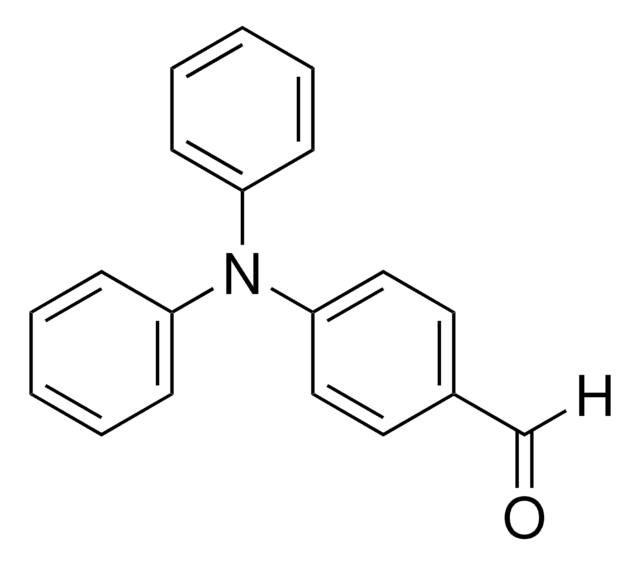D86256
4-Diethylaminobenzaldehyde
99%
Synonyme(s) :
4-(Diethylamino)benzaldehyde, 4-(N,N-Diethylamine)benzaldehyde, 4-(N,N-Diethylamino)benzaldehyde, 4-(N,N-Diethylphenyl)aldehyde, 4-Formyl-N,N-diethylaniline, N,N-Diethyl-4-formylaniline, N,N-Diethylaminobenzaldehyde, p-(Diethylamino)benzaldehyde, p-(N,N-Diethylamino)benzaldehyde, p-Formyl-N,N-diethylaniline
About This Item
Produits recommandés
Niveau de qualité
Pureté
99%
Forme
crystals
Point d'ébullition
174 °C/7 mmHg (lit.)
Pf
37-41 °C (lit.)
Chaîne SMILES
[H]C(=O)c1ccc(cc1)N(CC)CC
InChI
1S/C11H15NO/c1-3-12(4-2)11-7-5-10(9-13)6-8-11/h5-9H,3-4H2,1-2H3
Clé InChI
MNFZZNNFORDXSV-UHFFFAOYSA-N
Vous recherchez des produits similaires ? Visite Guide de comparaison des produits
Mention d'avertissement
Warning
Mentions de danger
Conseils de prudence
Classification des risques
Acute Tox. 4 Dermal - Eye Irrit. 2 - Skin Irrit. 2 - STOT SE 3
Organes cibles
Respiratory system
Code de la classe de stockage
11 - Combustible Solids
Classe de danger pour l'eau (WGK)
WGK 2
Point d'éclair (°F)
235.4 °F - closed cup
Point d'éclair (°C)
113 °C - closed cup
Équipement de protection individuelle
dust mask type N95 (US), Eyeshields, Faceshields, Gloves
Faites votre choix parmi les versions les plus récentes :
Déjà en possession de ce produit ?
Retrouvez la documentation relative aux produits que vous avez récemment achetés dans la Bibliothèque de documents.
Les clients ont également consulté
Notre équipe de scientifiques dispose d'une expérience dans tous les secteurs de la recherche, notamment en sciences de la vie, science des matériaux, synthèse chimique, chromatographie, analyse et dans de nombreux autres domaines..
Contacter notre Service technique










